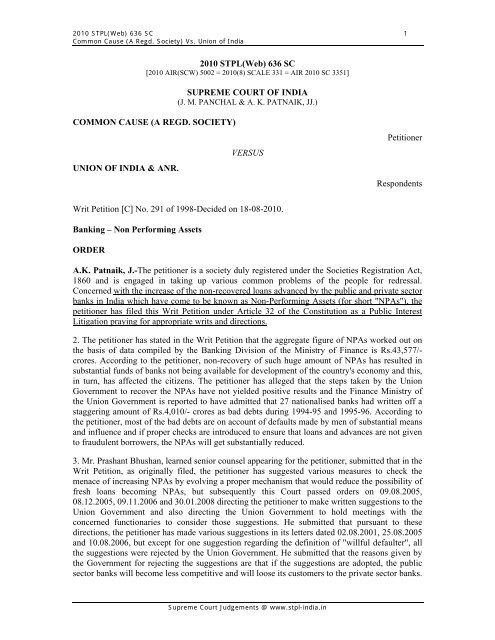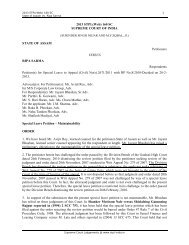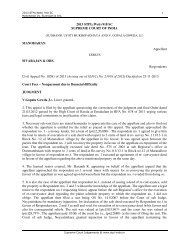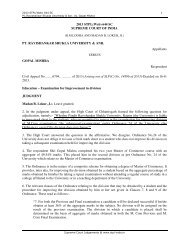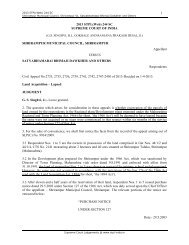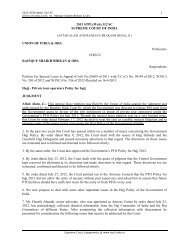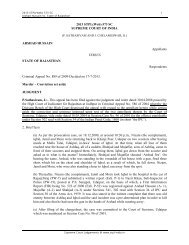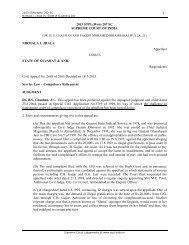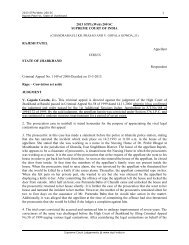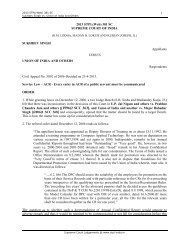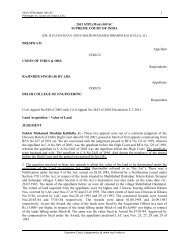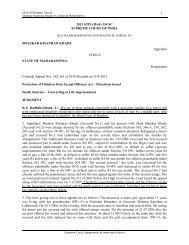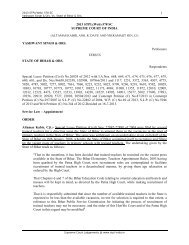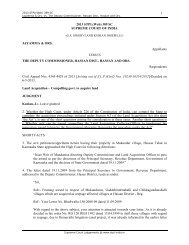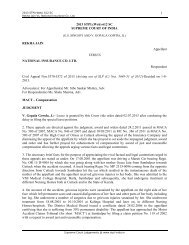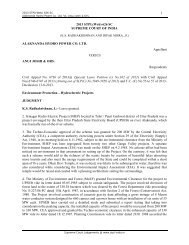Common Cause (A Regd. Society) Vs. Union of India - STPL ...
Common Cause (A Regd. Society) Vs. Union of India - STPL ...
Common Cause (A Regd. Society) Vs. Union of India - STPL ...
You also want an ePaper? Increase the reach of your titles
YUMPU automatically turns print PDFs into web optimized ePapers that Google loves.
2010 <strong>STPL</strong>(Web) 636 SC 1<br />
<strong>Common</strong> <strong>Cause</strong> (A <strong>Regd</strong>. <strong>Society</strong>) <strong>Vs</strong>. <strong>Union</strong> <strong>of</strong> <strong>India</strong><br />
2010 <strong>STPL</strong>(Web) 636 SC<br />
[2010 AIR(SCW) 5002 = 2010(8) SCALE 331 = AIR 2010 SC 3351]<br />
COMMON CAUSE (A REGD. SOCIETY)<br />
UNION OF INDIA & ANR.<br />
SUPREME COURT OF INDIA<br />
(J. M. PANCHAL & A. K. PATNAIK, JJ.)<br />
VERSUS<br />
Writ Petition [C] No. 291 <strong>of</strong> 1998-Decided on 18-08-2010.<br />
Banking – Non Performing Assets<br />
ORDER<br />
Petitioner<br />
Respondents<br />
A.K. Patnaik, J.-The petitioner is a society duly registered under the Societies Registration Act,<br />
1860 and is engaged in taking up various common problems <strong>of</strong> the people for redressal.<br />
Concerned with the increase <strong>of</strong> the non-recovered loans advanced by the public and private sector<br />
banks in <strong>India</strong> which have come to be known as Non-Performing Assets (for short "NPAs"), the<br />
petitioner has filed this Writ Petition under Article 32 <strong>of</strong> the Constitution as a Public Interest<br />
Litigation praying for appropriate writs and directions.<br />
2. The petitioner has stated in the Writ Petition that the aggregate figure <strong>of</strong> NPAs worked out on<br />
the basis <strong>of</strong> data compiled by the Banking Division <strong>of</strong> the Ministry <strong>of</strong> Finance is Rs.43,577/-<br />
crores. According to the petitioner, non-recovery <strong>of</strong> such huge amount <strong>of</strong> NPAs has resulted in<br />
substantial funds <strong>of</strong> banks not being available for development <strong>of</strong> the country's economy and this,<br />
in turn, has affected the citizens. The petitioner has alleged that the steps taken by the <strong>Union</strong><br />
Government to recover the NPAs have not yielded positive results and the Finance Ministry <strong>of</strong><br />
the <strong>Union</strong> Government is reported to have admitted that 27 nationalised banks had written <strong>of</strong>f a<br />
staggering amount <strong>of</strong> Rs.4,010/- crores as bad debts during 1994-95 and 1995-96. According to<br />
the petitioner, most <strong>of</strong> the bad debts are on account <strong>of</strong> defaults made by men <strong>of</strong> substantial means<br />
and influence and if proper checks are introduced to ensure that loans and advances are not given<br />
to fraudulent borrowers, the NPAs will get substantially reduced.<br />
3. Mr. Prashant Bhushan, learned senior counsel appearing for the petitioner, submitted that in the<br />
Writ Petition, as originally filed, the petitioner has suggested various measures to check the<br />
menace <strong>of</strong> increasing NPAs by evolving a proper mechanism that would reduce the possibility <strong>of</strong><br />
fresh loans becoming NPAs, but subsequently this Court passed orders on 09.08.2005,<br />
08.12.2005, 09.11.2006 and 30.01.2008 directing the petitioner to make written suggestions to the<br />
<strong>Union</strong> Government and also directing the <strong>Union</strong> Government to hold meetings with the<br />
concerned functionaries to consider those suggestions. He submitted that pursuant to these<br />
directions, the petitioner has made various suggestions in its letters dated 02.08.2001, 25.08.2005<br />
and 10.08.2006, but except for one suggestion regarding the definition <strong>of</strong> "willful defaulter", all<br />
the suggestions were rejected by the <strong>Union</strong> Government. He submitted that the reasons given by<br />
the Government for rejecting the suggestions are that if the suggestions are adopted, the public<br />
sector banks will become less competitive and will loose its customers to the private sector banks.<br />
Supreme Court Judgements @ www.stpl-india.in
2010 <strong>STPL</strong>(Web) 636 SC 2<br />
<strong>Common</strong> <strong>Cause</strong> (A <strong>Regd</strong>. <strong>Society</strong>) <strong>Vs</strong>. <strong>Union</strong> <strong>of</strong> <strong>India</strong><br />
He explained that the suggestions made by the petitioner mainly emphasized that the loans and<br />
advances must not be given without fully checking the creditworthiness and past record <strong>of</strong> the<br />
borrowers and that companies, which have been "willful defaulters" in the past or whose<br />
subsidiary companies and promoters have willfully defaulted in the past in repaying the loans and<br />
advances, should not be given fresh loans and advances. He also explained that the suggestions <strong>of</strong><br />
the petitioner also stress on the greater accountability <strong>of</strong> the bank <strong>of</strong>ficials and on the personal<br />
liability <strong>of</strong> the promoters by making personal guarantee <strong>of</strong> the promoters mandatory in every<br />
case. He vehemently argued that the <strong>Union</strong> Government could not possibly have any objection to<br />
these suggestions made by the petitioner and the reasons given in the affidavit <strong>of</strong> Shri Dharam<br />
Paul Bhardwaj, Under Secretary, Ministry <strong>of</strong> Finance, Department <strong>of</strong> Economic Affairs (Banking<br />
Division) filed on behalf <strong>of</strong> the <strong>Union</strong> Government for not accepting the suggestions are<br />
frivolous. On behalf <strong>of</strong> the petitioner, he urged the Court to issue appropriate writs and directions<br />
to the respondents to implement the suggestions made by the petitioner.<br />
4. Mr. Gopal Subramanium, learned Solicitor General for the <strong>Union</strong> <strong>of</strong> <strong>India</strong>, however, submitted,<br />
relying on the additional affidavit, that a number <strong>of</strong> steps have already been taken by the Ministry<br />
<strong>of</strong> Finance, Government <strong>of</strong> <strong>India</strong>, to address the issue <strong>of</strong> NPAs and bank frauds and these are:<br />
action taken under the Recovery <strong>of</strong> Debts due to Banks and Financial Institutions Act, 1993 (for<br />
short "the DRT Act") to recover the NPAs <strong>of</strong> Banks, the enactment <strong>of</strong> the Securitization and<br />
Reconstruction <strong>of</strong> Financial Assets and Enforcement <strong>of</strong> Security Interest Act, 2002 (for short "the<br />
SARFAESI Act") which empowers the banks to realize the securities furnished by the borrowers<br />
to the bank and to recover the loans and advances from the defaulted borrowers, the enactment <strong>of</strong><br />
the Credit Information Companies (Regulation) Act, 2005 which provides for the setting up <strong>of</strong><br />
Credit Information Companies for collection, sharing and dissemination <strong>of</strong> credit information,<br />
which will help in arresting fresh accretion <strong>of</strong> NPAs and framing <strong>of</strong> the rules under the Credit<br />
Information Companies (Regulation) Act, 2005, which would ensure that the Credit Information<br />
Companies collect, process and collate accurate and complete data relating to the borrowers, so<br />
that fresh loans and advances given to the borrowers do not become sticky. He submitted that<br />
besides the legislative measures, the Reserve Bank <strong>of</strong> <strong>India</strong> has been circulating a list <strong>of</strong> non- suit<br />
filed `doubtful' and `loss' borrowal accounts <strong>of</strong> Rs. 1 crore and above, on 31st March and on 30th<br />
September every year to the banks and financial institutions for their confidential use. He<br />
submitted that the banks and the <strong>Union</strong> Government also refer cases <strong>of</strong> bank frauds to the C.B.I.<br />
wherever considered necessary and appropriate and that the <strong>Union</strong> Government has set up in July,<br />
2003 the "Serious Fraud Investigation Office" (SFIO), which comprises <strong>of</strong>ficers specialized in<br />
various disciplines, such as Taxation, Customs, Central Excise, Information Technology,<br />
Company Law, Capital Market, Banking, Investigation/ Police, Forensic Audit, etc. and this<br />
expert and experienced body has already started functioning since October, 2003 and has been<br />
assigned a total <strong>of</strong> 51 cases <strong>of</strong> serious frauds up to 30.04.2008 out <strong>of</strong> which 30 cases have already<br />
been investigated and 18 cases are under investigation. He explained that SFIO is presently<br />
working under the existing provisions <strong>of</strong> the Companies Act but legislation will be brought to<br />
invest the SFIO with adequate reach and powers. He submitted that the Central Government has<br />
already constituted a Committee <strong>of</strong> Experts under the Chairmanship <strong>of</strong> the Ex-Deputy Governor<br />
<strong>of</strong> the Reserve Bank <strong>of</strong> <strong>India</strong> to make recommendations regarding the SFIO and the report <strong>of</strong> this<br />
Committee <strong>of</strong> Experts as and when received will be considered by the <strong>Union</strong> Government. He<br />
argued that since adequate mechanism presently exists to tackle the issue <strong>of</strong> NPAs and bank<br />
frauds and there has in fact been a sharp decrease in the level <strong>of</strong> NPAs in scheduled commercial<br />
banks from 4.4% <strong>of</strong> their net advances as on 31.03.2003 to 1.0% as on 31.03.2008, this Court<br />
should not issue any writs or directions, as prayed for, by the petitioner.<br />
5. In rejoinder, Mr. Prashant Bhushan submitted that the reduction in NPAs, as claimed by the<br />
<strong>Union</strong> Government, has come about by waivers, write-<strong>of</strong>fs, rescheduling <strong>of</strong> repayments,<br />
Supreme Court Judgements @ www.stpl-india.in
2010 <strong>STPL</strong>(Web) 636 SC 3<br />
<strong>Common</strong> <strong>Cause</strong> (A <strong>Regd</strong>. <strong>Society</strong>) <strong>Vs</strong>. <strong>Union</strong> <strong>of</strong> <strong>India</strong><br />
moratoriums and one-time settlements but all this has actually resulted in loss <strong>of</strong> substantial<br />
amount <strong>of</strong> public funds. He submitted that as per the report <strong>of</strong> the Reserve Bank <strong>of</strong> <strong>India</strong> on the<br />
trend and progress <strong>of</strong> banking in <strong>India</strong> for 2004- 2005, total NPAs recovered by the banks<br />
amounted to Rs.20,568/-crore and out <strong>of</strong> this, an amount <strong>of</strong> Rs.14,506/- crore was recovered<br />
through asset reconstruction companies and these recoveries are nothing but purchase <strong>of</strong> NPAs<br />
from the banks by another set <strong>of</strong> public companies. He submitted that the report <strong>of</strong> the Reserve<br />
Bank <strong>of</strong> <strong>India</strong> would further show that during 2004-2005 an additional Rs.16,000 crore <strong>of</strong> NPAs<br />
have accrued. He submitted that the measures taken by the <strong>Union</strong> Government to reduce the<br />
NPAs, therefore, have not been effective. He finally submitted that without statutory power and<br />
without qualified manpower, the SFIO would be teeth-less and incompetent and this Court should<br />
direct the <strong>Union</strong> Government to make the SFIO an independent statutory body consisting <strong>of</strong><br />
qualified manpower as suggested by Mr. Harish Salve, learned senior Counsel.<br />
6. Mr. Bhushan cited the decision <strong>of</strong> this Court in Vishaka and Others v. State <strong>of</strong> Rajasthan<br />
and Others [(1997) 6 SCC 241] for the proposition that if there is no enacted legislation to<br />
provide for the effective enforcement <strong>of</strong> any fundamental right, this Court can issue<br />
guidelines/directions for the effective enforcement <strong>of</strong> the fundamental right under Article 32 <strong>of</strong><br />
the Constitution, which would be law under Article 141 <strong>of</strong> the Constitution, till a suitable<br />
legislation is enacted to occupy the field. He also relied on the decision in Vineet Narian & Ors.<br />
v. <strong>Union</strong> <strong>of</strong> <strong>India</strong> & Anr. [(1998) 1 SCC 226] in which this Court has observed that the<br />
judiciary must step in, in exercise <strong>of</strong> its constitutional obligations under Article 32 read with<br />
Article 142 <strong>of</strong> the Constitution, to provide a solution till such time as the legislature acts to<br />
perform its role by enacting proper legislation to cover the field. He submitted that in case this<br />
Court is not inclined to issue directions or writs in the matter, the Court can at least direct that the<br />
suggestions made by the petitioner for checking the NPAs in future be referred to an independent<br />
expert committee.<br />
7. In Vishaka and Others v. State <strong>of</strong> Rajasthan and Others (supra) cited by Mr. Bhushan, this<br />
Court held that in the absence <strong>of</strong> enacted law to provide for the effective enforcement <strong>of</strong> the basic<br />
human right <strong>of</strong> gender equality and guarantee against sexual harassment and abuse, more<br />
particularly against sexual harassment at workplaces, some guidelines and norms for due<br />
observance at all workplaces or other institutions were required to be laid down by this Court<br />
until a legislation is enacted for the purpose and this Court made it clear that this was required to<br />
be done in exercise <strong>of</strong> the power available under Article 32 <strong>of</strong> the Constitution for enforcement <strong>of</strong><br />
the Fundamental rights guaranteed under Articles 14, 15, 19(1)(g) and 21 <strong>of</strong> the Constitution.<br />
Similarly, in Vineet Narain and Others v. <strong>Union</strong> <strong>of</strong> <strong>India</strong> and Another (supra), this Court issued<br />
some directions for rigid compliance till such time as the legislature steps in to substitute them by<br />
proper legislation and these directions were made under Article 32 read with Article 142 <strong>of</strong> the<br />
Constitution to implement the rule <strong>of</strong> law wherein the concept <strong>of</strong> equality enshrined in Article 14<br />
is embedded. Hence, in both the cases cited by Mr. Prashant Bhushan, the Court issued writs and<br />
directions for enforcement <strong>of</strong> fundamental rights conferred by Part-III <strong>of</strong> the Constitution, but in<br />
the present case, the petitioner has not made out a case that for enforcement <strong>of</strong> any right<br />
guaranteed under Part-III <strong>of</strong> the Constitution, writs or directions are required to be issued by this<br />
Court under Article 32 <strong>of</strong> the Constitution.<br />
8. Moreover, in Vishaka and Others v. State <strong>of</strong> Rajasthan and Others (supra), this Court laid down<br />
guidelines and norms for due observance at work places and institutions to prevent sexual<br />
harassment <strong>of</strong> working women, because there was no law to prevent such sexual harassment. In<br />
the present case, we find from the additional affidavit filed on behalf <strong>of</strong> the <strong>Union</strong> <strong>of</strong> <strong>India</strong> that<br />
through various legislative measures such as the DRT Act, the SARFAESI Act, 2002, the Credit<br />
Information Companies (Regulation) Act, 2005 and through some administrative measures, the<br />
Supreme Court Judgements @ www.stpl-india.in
2010 <strong>STPL</strong>(Web) 636 SC 4<br />
<strong>Common</strong> <strong>Cause</strong> (A <strong>Regd</strong>. <strong>Society</strong>) <strong>Vs</strong>. <strong>Union</strong> <strong>of</strong> <strong>India</strong><br />
respondents are trying to reduce the number and amount <strong>of</strong> NPAs and to detect and check bank<br />
frauds in future.<br />
9. According to Mr. Prashant Bhushan, however, these legislative and administrative measures<br />
taken by the <strong>Union</strong> Government have not been effective in reducing and controlling the NPAs.<br />
Whether legislative and administrative measures taken by the <strong>Union</strong> Government have been<br />
effective or not is not for the Court but for the <strong>Union</strong> Government and Parliament to consider<br />
because reduction and control <strong>of</strong> NPAs are not within the domain <strong>of</strong> judiciary but within the<br />
domain <strong>of</strong> the Executive and Legislature under our Constitution. Moreover, as has been observed<br />
by P.N. Bhagwati, J. in State <strong>of</strong> M.P. and Others v. Nandlal Jaiswal and Others [(1986) 4<br />
SCC 566] in field <strong>of</strong> economic activities, there has to be judicial deference to Legislative and<br />
Executive judgment and decisions on complex economic matters are to be based on<br />
experimentation or what one may call `trial and error method'. It is therefore not for Courts to sit<br />
in judgment whether a particular policy decision <strong>of</strong> the Government is effective or not, but for<br />
Parliament to debate and decide on the policy decision. In a recent decision <strong>of</strong> this Court in<br />
Villianur Iyarkkai Padukappu Maiyam v. <strong>Union</strong> <strong>of</strong> <strong>India</strong> and Others [(2009) 7 SCC 561],<br />
Panchal, J. writing the judgment on behalf <strong>of</strong> a three- Judge Bench observed:<br />
"It is neither within the domain <strong>of</strong> the courts nor the scope <strong>of</strong> judicial review to embark<br />
upon an enquiry as to whether a particular public policy is wise or whether better public<br />
policy can be evolved. Nor are the courts inclined to strike down a policy at the behest <strong>of</strong><br />
a petitioner merely because it has been urged that a different policy would have been<br />
fairer or wiser or more scientific or more logical. Wisdom and advisability <strong>of</strong> economic<br />
policy are ordinarily not amenable to judicial review. In matters relating to economic<br />
issues the Government has, while taking a decision, right to "trial and error" as long as<br />
both trial and error are bona fide and within the limits <strong>of</strong> the authority. For testing the<br />
correctness <strong>of</strong> a policy, the appropriate forum is Parliament and not the courts."<br />
10. The <strong>Union</strong> Government, however, must ensure that SFIO is effective in detecting and<br />
preventing bank frauds by influential people. We find that the Central Government has<br />
constituted a Committee <strong>of</strong> Experts under the Chairmanship <strong>of</strong> Shri Vepa Kamesam, Ex-Deputy<br />
Governor <strong>of</strong> Reserve Bank <strong>of</strong> <strong>India</strong>, with the following terms <strong>of</strong> reference: (a) Assessment <strong>of</strong> the<br />
need for and details <strong>of</strong> a separate stature to govern the constitution and functioning <strong>of</strong> SFIO; (b)<br />
The nature and details <strong>of</strong> the legislative changes as may be required in existing laws, to enable<br />
effective functioning <strong>of</strong> SFIO including prosecution <strong>of</strong> <strong>of</strong>fences detected by it; (c) The<br />
mechanism for referral <strong>of</strong> cases to SFIO and coordination <strong>of</strong> activities <strong>of</strong> SFIO with other<br />
agencies/organizations <strong>of</strong> the Central and State Governments, including investigating; (d) Powers<br />
<strong>of</strong> SFIO and its investigation <strong>of</strong>ficers; (e) Specification <strong>of</strong> <strong>of</strong>fences and penalties to enable<br />
effective conduct <strong>of</strong> investigation agencies and the need for Special Courts for trial <strong>of</strong> corporate<br />
fraud cases; and (f) Other matters consequential to or in pursuance <strong>of</strong> the above. We have no<br />
doubt that this Committee <strong>of</strong> Experts under the Chairmanship <strong>of</strong> Ex-Deputy Governor <strong>of</strong> Reserve<br />
Bank <strong>of</strong> <strong>India</strong> will suggest effective measures, legislative or administrative, to ensure that bank<br />
frauds are prevented in future and the NPAs are kept to the minimum. We hope and trust that this<br />
Committee under the Chairmanship <strong>of</strong> Ex-Deputy Governor <strong>of</strong> Reserve Bank <strong>of</strong> <strong>India</strong> will<br />
consider the suggestion to make the SFIO (or any similar body) a statutory authority having<br />
sufficient powers and having the required autonomy to be able to effectively deal with the<br />
problems <strong>of</strong> bank frauds and NPAs. A copy <strong>of</strong> this order will be placed by the respondent No.1<br />
before the Committee <strong>of</strong> Experts.<br />
11. The writ petition and the application for impleadment/ intervention stand disposed <strong>of</strong>. No<br />
costs.<br />
Supreme Court Judgements @ www.stpl-india.in
2010 <strong>STPL</strong>(Web) 636 SC 5<br />
<strong>Common</strong> <strong>Cause</strong> (A <strong>Regd</strong>. <strong>Society</strong>) <strong>Vs</strong>. <strong>Union</strong> <strong>of</strong> <strong>India</strong><br />
------<br />
Supreme Court Judgements @ www.stpl-india.in


